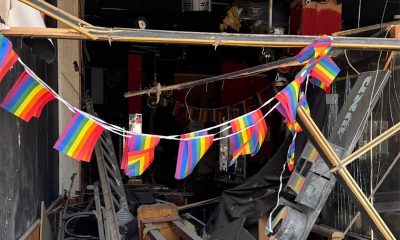World
Out in the World: LGBTQ news from Europe and Asia
Sept. 16 marked a year since Mahsa Amini’s death in Iran

Iran
Shadi Amin, the executive director of Germany-based Iranian LGBTQ network 6rang (Iranian Lesbian and Transgender Network), grew up in Iran thinking she was “sick” because she’s queer. In a recent interview with PinkNewsUK, Amin reflected on the death of 22-year-old Mahsa Amini for allegedly not wearing a headscarf properly by Iran’s dreaded “morality police.”
The death of the young Iranian Kurdish woman on Sept. 16, 2022, touched off massive protests across the country, especially in its capital city of Tehran. But Amin points out that those protests over Amini’s death led to become a rally call to fight for the rights of women, LGBTQ folks and other marginalized groups in Iran.
“[LGBTQ+ people] are one of the most active and involved groups in these demonstrations and protests last year … We saw everywhere when there was a demonstration [there was] the rainbow flag, even if sometimes the people didn’t agree with that and they said go back,” Amin told PinkNewsUK.
“They tried to put us out of the demonstration, but I think our LGBTI youth community is really powerful and they try to bring their demands in this movement,” she added.
More than 22,000 people were arrested and hundreds killed, including some who were executed by the Iranian government in an effort to crush dissent through violence.
Read the entire interview here: [Link]
Serbia
Earlier this month several hundred LGBTQ people and the allies marched in the Serbian capital of Belgrade marking the celebration of a Pride march that was unmarred by violence in this religious conservative Balkan nation.
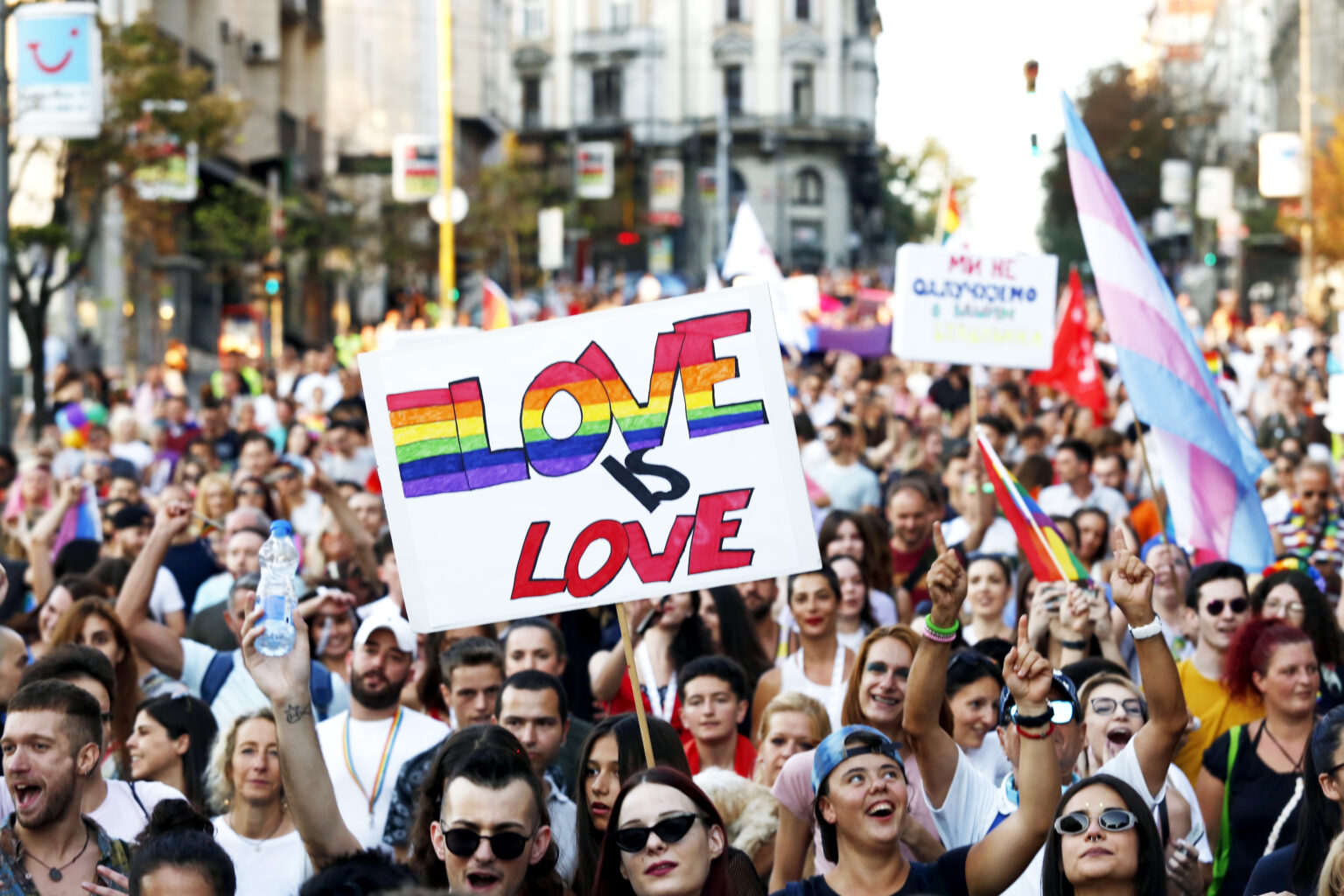
Radio Free Europe noted that in a similar event last year, at least 21 people were arrested in connection with attacks against police, with most of them suspected of being far-right hooligans protesting against the LGBTQ Pride march.
The government of Serbian President Aleksandar Vucic reversed its decision to ban the international EuroPride parade event on Thursday, Serbian state media reported.
On Sept. 12, officials from EuroPride and Belgrade Pride, commemorated the start of EuroPride 2022 in Belgrade with a ceremonial flag raising. On Friday led by the Dutch Embassy, members of the European Union and other non-EU states issued a joint statement applauding the Serbian government’s roll-back of the ban.
United Kingdom

A 29-year-old man was arrested by Greater Manchester Police in connection with the vandalistic attacks on the Clonezone store on Sackville Street in the heart of Manchester Center. The store is the U.K.’s first and favorite Queer Superstore.
The suspect also being held on suspicion of 24 motor vehicle thefts and remains in custody for questioning.
Clonezone has been attacked five times this year, with the latest incident on Sept. 10 at approximately 2 p.m. Two men approached the shop on a bike on Sunday and attempted to smash the windows before throwing an object at the doors.
Chief Inspector Steve Wiggins, of GMP’s City Center Neighborhood Team, said: “This is the second arrest in connection with this series of disturbing incidents but the investigation is still very much ongoing.
The attacks are very specific with offenders arriving on bikes and causing significant damage.
We are keen to find out the motivations behind the attacks and believe that will help us trace those responsible and bring them to justice.
We have a dedicated team investigating these incidents, so if anybody knows anything about these attacks I would urge them to call police.”
Information can be passed on to police by calling 0161 856 3345 or via 101, or anonymously through Crimestoppers at 0800 555 111.
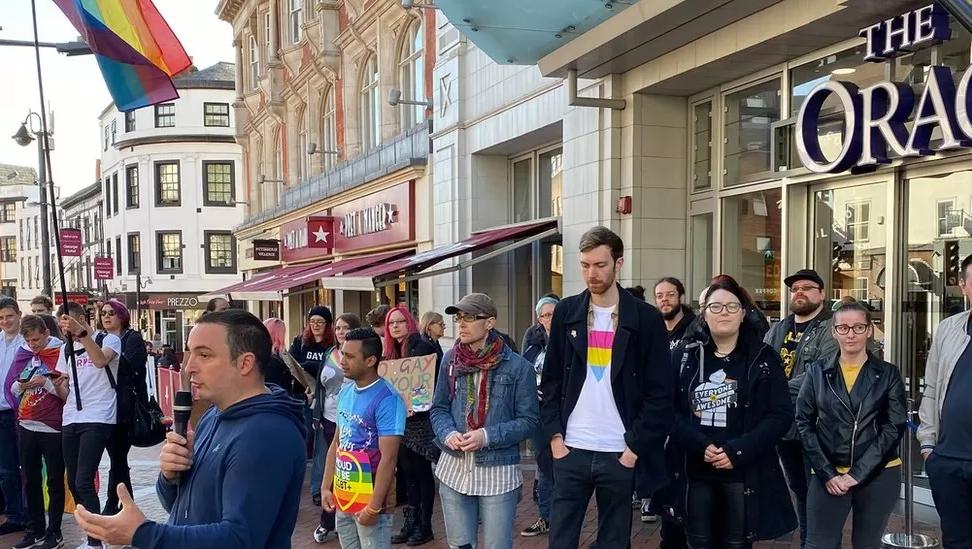
American fast food chain Chick-Fil-A announced its plans to open five new franchise stores around Britain in as yet to be disclosed locations, the BBC reported on Sept. 15.
Chick-fil-A had previously launched a pop-up store for a six month lease in the Oracle shopping center in Reading in 2019, but was met with severe opposition and its lease wasn’t renewed. British LGBTQ rights activists protested the College Park, Ga.,-based food chain’s donations to groups that have a record of being opposed to LGBTQ rights.
During the 2019 protests in Reading, the BBC noted that Reading Pride spokesperson Kirsten Bayes told protesters: “Companies like this have no place here in Reading and they have no place anywhere.
“We are standing in solidarity with campaigners across the United States … for justice and freedom for LGBT people.”
A local elected official, Reading Labor Councilor Sarah Hacker said: “We can make sure that they don’t spread their hatred across the U.K.”
The fast food chain firm is run by the Cathy family, who have publicly stated their opposition to same-sex marriage and other LGBTQ issues. In 2020, the firm softened its stance and shifted its focus, hiring a diversity vice president. The BBC reported that the company changed its approach to charitable giving, focusing on education and hunger alleviation, moving away from donations directed at anti-LGBTQ organizations, including several of those listed as extremist hate groups by the Southern Poverty Law Center.
“From our earliest days, we’ve worked to positively influence the places we call home and this will be the same for our stores in the U.K.,” Joanna Symonds, Chick-Fil-A’s head of U.K. operations, told the BBC.
“We encourage our operators to partner with organizations which support and positively impact their local communities, delivering great food and wider benefits to those around them,” she added.
In announcing the new U.K. investment, the chain highlighted its current charitable work, which include a $25,000 one-off donation to a local non-profit organization when a Chick-fil-A restaurant is opened, and donations of surplus food to local shelters, soup kitchens and food charities. Those policies would apply to its U.K. branches too, it said.
Ireland
The apparent rebranding of a beloved LGBTQ bar and safe space in Cork and makeover provoked protests by the local queer community.
Irish LGBTQ publication GCN reported that in recent weeks, people began to notice a change in the appearance of Chambers Bar, no longer recognizable as an LGBTQ space. A new sign had been displayed above the doorway with the name “Sinners” in black and white, a stark contrast to the venue’s once vibrant appearance.
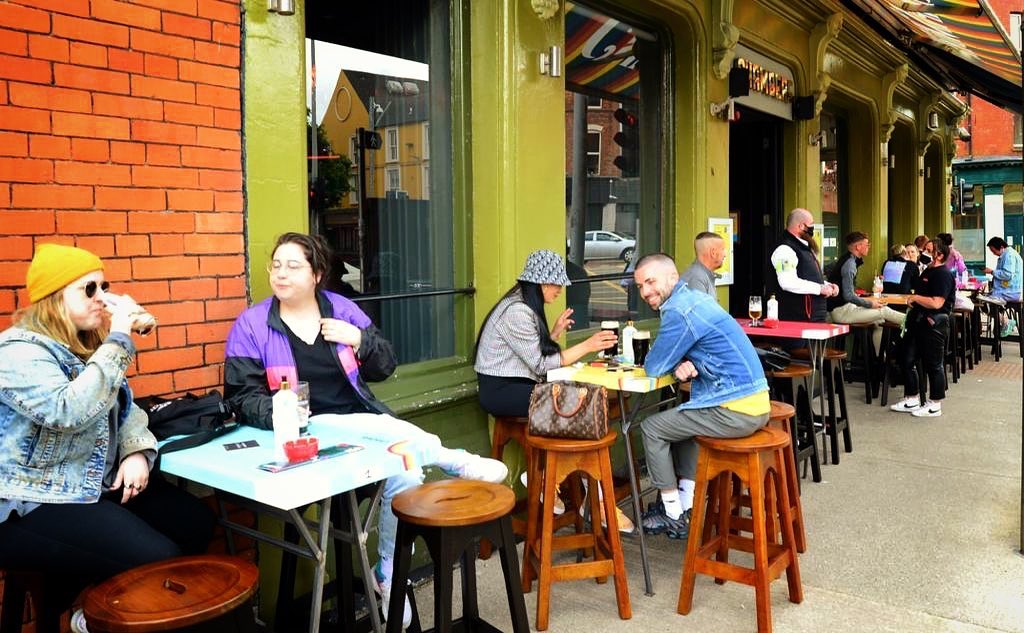
This name is nothing new to people in Cork, as Chambers Bar has been hosting student nights under this name for a number of years. Even so, this year was the first time that, in addition to hosting a student night for “Freshers” Week, all Pride flags, rainbow curtains and posters for upcoming drag shows were also taken down.
However, the catalyst for sparking an onslaught of backlash seems to have come from the cancellation of a weekly drag show. This was to be hosted by Cork drag queen Krystal Queer, who took to Instagram to express her disappointment in a video that now has over 300,000 views.
In stark contrast to the small group of anti-transgender protesters gathered in Dublin to hear anti-LGBTQ TERF Kellie-Jay Keen, a.k.a. Posie Parker, speak at her “Let Women Speak Rally” at Merrion Square, Trans and Intersex Pride Dublin had nearly a thousand supporters turn out to counter demonstrate.
The Irish Times reported that a large police presence was visible in and around the square and metal barriers were erected to create a space between the rival demonstrations.
The counter demo by Trans and Intersex Pride Dublin assembled outside the lower house of the Irish legislature on Kildare Street ahead of marching into Merrion Square.
Leading pro-trans activist Jenny Maguire told the crowd: “We as queer people are forced into a world that’s not meant for us.”
“We do everything we can to force a world that accepts us and that can love us all unapologetically, and it is them that wants to reverse any progress we’ve made so far and pull us back into the Dark Ages.”
Italy
Italy’s right-wing Prime Minister Giorgia Meloni has demanded local councils only list biological parents on birth certificates, flinging hundreds of same-sex couples into a legal morass, France 24 News reported Thursday.
Journalist Lara Bullens reported that after same-sex civil unions were legalised in Italy in 2016, and in the absence of any clear legislation on parental rights for same-sex couples, a handful of city councils across the country started listing parents of the same gender on their children’s birth certificate.
This led to a situation of creating a host of “ghost parents.”
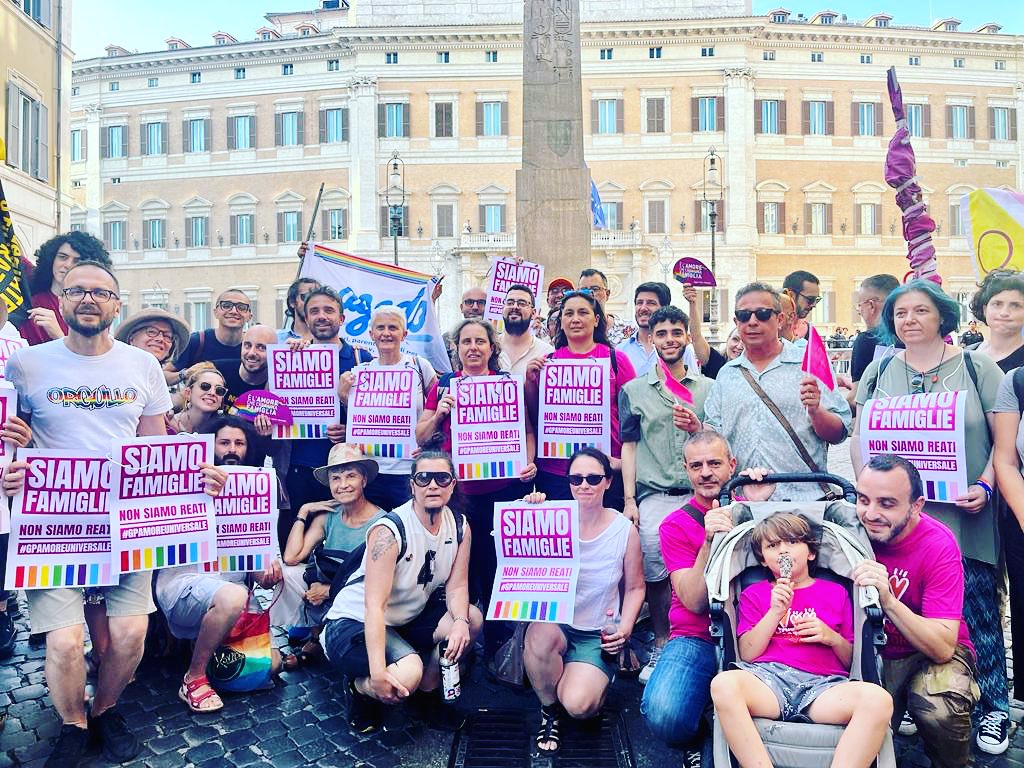
But in recent months, Italy’s right-wing government has been cracking down on city councils to stop listing same-sex parents on birth certificates, France 24 reported. Led by the hardline traditionalist Meloni, the ministry of interior issued a directive in January 2023 instructing Italian mayors to stop automatically registering the births of children conceived or born abroad through assisted reproductive methods.
It cited a case from December 2022, in which Italy’s top court ruled that a child of a gay couple who was conceived through surrogacy abroad shouldn’t have their birth certificate automatically transcribed in Italy.
Though the directive primarily concerned surrogacy, which is banned in Italy and now even a crime for those seeking surrogacy abroad, its interpretation by local councils has disproportionally affected LGBTQ families — including those who resort to other reproductive methods.
Italy’s Family Minister Eugenia Roccella told Italian newspaper Corriere della Serra: “In Italy, one becomes a parent in only two ways — either by biological relationship or by adoption,” and urged same-sex parents to follow the adoption procedure.
Currently the support for LGBTQ families on this issue is being provided by the LGBTQ rights organization, Famiglie Arcobaleno working alongside Rete Lenford, which is committed to advocacy for LGBTQ rights as an association of lawyers, lawyers, practitioners, scholars, students and people with experience in the issues surrounding LGBTQ rights.
Both Rete Lenford and Famiglie Arcobaleno, are representing hundreds of cases of the affected LGBTQ families in court.
Russia
(The following article is from Human Rights Watch)
Last week the European Court of Human Rights handed down a ruling in the case of Maxim Lapunov, the only victim of Chechnya’s vile 2017 anti-gay purge who dared seek justice for the torture he suffered at the hands of local law enforcement.
The court found Lapunov was “detained and subjected to ill-treatment by State agents,” which “amounted to torture” and was perpetrated “solely on account of his sexual orientation.”
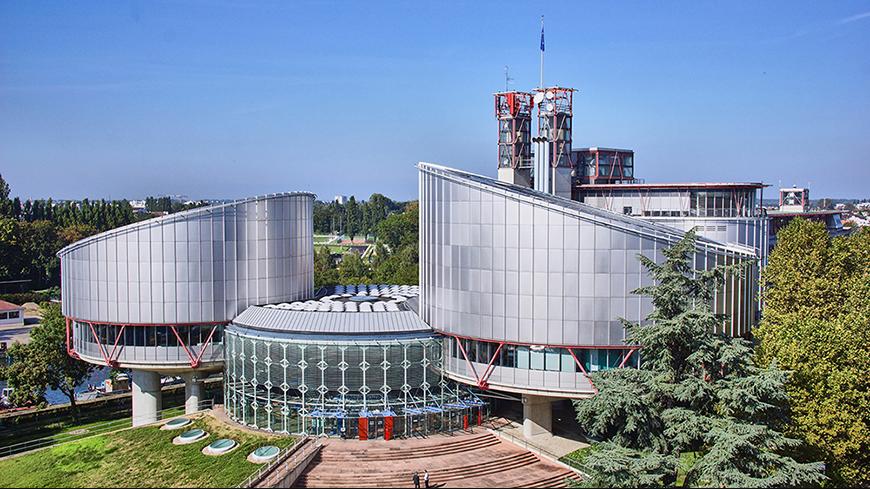
Lapunov took his case to the European Court in May 2019 because the Russian authorities had failed to investigate his assault. Despite great personal risk, Lapunov had been eager to cooperate with Russia’s investigative authorities through the assistance of his persistent lawyers from the Committee Against Torture, a leading Russian human rights group.
Tanya Lokshina, the associate director, Europe and Central Asia Division for Human Rights Watch noted:
“I first met Lapunov nearly six years ago, when I moderated a news conference in Moscow at which he publicly told his story for the first time. Lapunov, then 30, described to a roomful of journalists how he had been rounded up and tortured along with dozens of others. His hands shook as he detailed the horrific experience. He stopped several times to regain composure but kept going.”
A Russian from Siberia who had traveled to Chechnya for work, Lapunov did not have to face what every Chechen man caught in the purge feared: Being targeted by his own relatives or exposing his entire family to overwhelming stigma because of his homosexuality. His captors threatened to kill him if he spoke out, but he refused to be silent. “We all have rights …,” he said at the news conference. “If we just let it be [in Chechnya], … we’ll never know whose son or daughter will be taken next.”
At the time, Russian authorities claimed they could not investigate the purge because no victims stepped up to testify. When Lapunov provided his staggering testimony, they still failed to investigate. In early 2019, Chechen police rounded up and tortured more men because of their presumed sexual orientation. Realizing they would never get the Russian authorities to do their job and investigate, Lapunov and his legal team filed their complaint with the European Court of Human Rights. Today, they won.
After Russia’s full-scale invasion of Ukraine, Russia lost its Council of Europe membership and there is no hope that the Russian authorities will implement this ruling anytime soon. Yet it sets the record straight. This, I hope, will serve to support all survivors of the purge.
Additional reporting from PinkNewsUK, BBC, Agence France-Presse, GCN Ireland, the Irish Times and Human Rights Watch.
India
Anaya Bangar challenges ban on trans women in female cricket teams
Former Indian cricketer Sanjay Bangar’s daughter has received support

Anaya Bangar, the daughter of former Indian cricketer Sanjay Bangar, has partnered with the Manchester Metropolitan University Institute of Sport in the U.K. to assess her physiological profile following her gender-affirming surgery and undergoing hormone replacement therapy.
From January to March 2025, the 23-year-old underwent an eight-week research project that measured her glucose levels, oxygen uptake, muscle mass, strength, and endurance after extensive training.
The results, shared via Instagram, revealed her metrics align with those of cisgender female athletes, positioning her as eligible for women’s cricket under current scientific standards. Bangar’s findings challenge the International Cricket Council’s 2023 ban on transgender athletes in women’s cricket, prompting her to call for a science-based dialogue with the Board of Control for Cricket in India and the ICC to reform policies for transgender inclusion.
“I am talking with scientific evidence in my hand,” Bangar said in an interview posted to her Instagram page. “So, I hope, this makes an impact and I will be hoping to BCCI and ICC talking with me and discussing this further.”
On Nov. 21, 2023, the ICC enacted a controversial policy barring trans women from international women’s cricket. Finalized after a board meeting in Ahmedabad, India, the regulation prohibits any trans player who has experienced male puberty from competing, irrespective of gender-affirming surgery or hormone therapy. Developed through a 9-month consultation led by the ICC’s Medical Advisory Committee, the rule aims to safeguard the “integrity, safety, and fairness” of women’s cricket but has drawn criticism for excluding athletes like Canada’s Danielle McGahey, the first trans woman to play internationally. The policy, which allows domestic boards to set their own rules, is slated for review by November 2025.
Bangar shared a document on social media verifying her participation in a physiological study at the Manchester Metropolitan University Institute of Sport, conducted from Jan. 20 to March 3, 2025, focused on cricket performance. The report confirmed that her vital metrics — including haemoglobin, blood glucose, peak power, and mean power — aligned with those of cisgender female athletes. Initially, her fasting blood glucose measured 6.1 mmol/L, slightly above the typical non-diabetic range of 4.0–5.9 mmol/L, but subsequent tests showed it normalized, reinforcing the study’s findings that her physical profile meets female athletic standards.
“I am submitting this to the BCCI and ICC, with full transparency and hope,” said Bangar. “My only intention is to start a conversation based on facts not fear. To build space, not divide it.”
In a letter to the BCCI and the ICC, Bangar emphasized her test results from the Manchester Metropolitan University study. She explained that the research aimed to assess how hormone therapy had influenced her strength, stamina, haemoglobin, glucose levels, and overall performance, benchmarked directly against cisgender female athletic standards.
Bangar’s letter to the BCCI and the ICC clarified the Manchester study was not intended as a political statement but as a catalyst for a science-driven dialogue on fairness and inclusion in cricket. She emphasized the importance of prioritizing empirical data over assumptions to shape equitable policies for trans athletes in the sport.
Bangar urged the BCCI, the world’s most influential cricket authority, to initiate a formal dialogue on trans women’s inclusion in women’s cricket, rooted in medical science, performance metrics, and ethical fairness. She called for the exploration of eligibility pathways based on sport-specific criteria, such as haemoglobin thresholds, testosterone suppression timelines, and standardized performance testing. Additionally, she advocated for collaboration with experts, athletes, and legal advisors to develop policies that balance inclusivity with competitive integrity.
“I am releasing my report and story publicly not for sympathy, but for truth. Because inclusion does not mean ignoring fairness, it means measuring it, transparently and responsibly,” said Bangar in a letter to the BCCI. “I would deeply appreciate the opportunity to meet with you or a representative of the BCCI or ICC to present my findings, discuss possible policy pathways, and work towards a future where every athlete is evaluated based on real data, not outdated perceptions.”
Before her transition, Bangar competed for Islam Gymkhana in Mumbai and Hinckley Cricket Club in the U.K., showcasing her talent in domestic cricket circuits. Her father, Sanjay Bangar, was a dependable all-rounder for the Indian national cricket team from 2001 to 2004, playing 12 test matches and 15 One Day Internationals. He later served as a batting coach for the Indian team from 2014 to 2019, contributing to its strategic development.
Cricket in India is a cultural phenomenon, commanding a fanbase of more than 1 billion, with more than 80 percent of global cricket viewership originating from the country.
The International Cricket Council, the sport’s governing body, oversees 12 full member nations and more than 90 associate members, with the U.S. recently gaining associate member status in 2019 and co-hosting the 2024 ICC Men’s T20 World Cup. The BCCI generated approximately $2.25 billion in revenue in the 2023–24 financial year, primarily from the Indian Premier League, bilateral series, and ICC revenue sharing. The ICC earns over $3 billion from media rights in India alone for the 2024–27 cycle, contributing nearly 90 percent of its global media rights revenue, with the BCCI receiving 38.5 percent of the ICC’s annual earnings, approximately $231 million per year.
Women’s cricket in India enjoys a growing fanbase, with over 300 million viewers for the Women’s Premier League in 2024, making it a significant driver of the sport’s global popularity. The International Cricket Council oversees women’s cricket in 12 full member nations and over 90 associate members, with the U.S. fielding a women’s team since gaining associate status in 2019 and competing in ICC events like the 2024 Women’s T20 World Cup qualifiers. The BCCI invests heavily in women’s cricket, allocating approximately $60 million annually to the WPL and domestic programs in 2024–25, while contributing to the ICC’s $20 million budget for women’s cricket development globally. India’s media market for women’s cricket, including WPL broadcasting rights, generated $120 million in 2024, accounting for over 50 percent of the ICC’s women’s cricket media revenue.
“As a woman, I feel when someone says that they are women, then they are, be trans or cis. A trans woman is definitely the same as a cis woman emotionally and in vitals, and specially, when someone is on hormone replacement therapy. Stopping Anaya Bangar from playing is discrimination and violation of her rights. It is really sad and painful that every transwoman need to fight and prove their identity everywhere,” said Indrani Chakraborty, an LGBTQ rights activist and a mother of a trans woman. “If ICC and BCCI is stopping her from playing for being transgender, then I will say this to be their lack of awareness and of course the social mindsets which deny acceptance.”
Chakraborty told the Blade that Bangar is an asset, no matter what. She said that the women’s cricket team will only benefit by participation, but the discriminating policies are the hindrance.
“Actually the transgender community face such discrimination in every sphere. In spite of being potent, they face rejection. This is highly inhuman. These attitudes is regressive and will never let to prosper. Are we really in 2025?,” said Chakraborty. “We, our mindset and the society are the issues. We, as a whole, need to get aware and have to come together for getting justice for Anaya. If today, we remain silent, the entire community will be oppressed. Proper knowledge of gender issues need to be understood.”
The BCCI and the International Cricket Council have not responded to the Blade’s repeated requests for comment.
El Salvador
La marcha LGBTQ desafía el silencio en El Salvador
Se realizó el evento en San Salvador bajo la lluvia, pero con orgullo

SAN SALVADOR, El Salvador — El reloj marcaba el mediodía cuando los primeros colores del arcoíris comenzaron a ondear frente a la emblemática Plaza del Divino Salvador del Mundo. A pesar de la incertidumbre generada en redes sociales, donde abundaban los rumores sobre una posible cancelación de la marcha por la diversidad sexual, la ciudad capital comenzaba a llenarse de esperanza, de resistencia y de orgullo.
Este año, la Marcha del Orgullo LGBTQ+ en El Salvador se desarrolló en un contexto tenso, en medio de un clima político que reprime y silencia a las voces disidentes.
“Aunque las estadísticas digan que no existimos, viviendo en El Salvador, un país donde hoy, después de décadas de avances, defender los derechos humanos es de nuevo una causa perseguida, criminalizada y silenciada”, afirmaron representantes de la Federación Salvadoreña LGBTQ+.
A pesar de la cancelación del festival cultural que usualmente acompaña la marcha, los colectivos decidieron seguir adelante con la movilización, priorizando el sentido original de la actividad: salir a las calles para visibilizarse, exigir respeto a sus derechos y recordar a quienes ya no están.
A la 1:30 p.m., una fuerte lluvia comenzó a caer sobre la ciudad. Algunas de las personas presentes corrieron a refugiarse, mientras otras, debajo de sombrillas y de los escasos árboles en la plaza, decidieron mantenerse firmes. Los comentarios pesimistas no se hicieron esperar: “a lo mejor la cancelan por el clima”, “no se ve tanta gente como otros años”. Sin embargo, lo que siguió fue una muestra de resistencia: a las 2:05 p.m. las voces comenzaron a llamar a tomar las calles.
Visibilidad como resistencia
La marcha arrancó bajo una llovizna persistente. La Avenida Roosevelt y la Alameda Juan Pablo II se tiñeron de colores con banderas arcoíris, trans, lésbicas, bisexuales y otras que representan a los diversos sectores de la población LGBTQ. Cada bandera alzada fue un acto político, cada paso una declaración de existencia.
Desde la Plaza del Divino Salvador del Mundo hasta la Plaza Gerardo Barrios, frente a Catedral Metropolitana y el Palacio Nacional, la marcha se convirtió en un carnaval de dignidad. Carteles con frases como “El amor no se reprime”, “Mi existencia no es delito” o “Marcho por quien ya no puede hacerlo” se alzaron entre las multitudes.
La movilización fue también un espacio para recordar a quienes han perdido la vida por la discriminación y el rechazo. Familias que marcharon por hijos, hijas o amigues que se suicidaron a causa del estigma. Personas que caminaron por quienes aún viven en el miedo, por quienes no pudieron salir del clóset, por quienes se han ido del país huyendo de la violencia.
Arte, fe y rebeldía
Una de las escenas más llamativas fue protagonizada por Nelson Valle, un joven gay que marchó vestido como sacerdote.
“Hay muchas personas que secretamente asisten a ritos religiosos como en Semana Santa, y les gusta vivir en lo oculto. Pero la fe debe ser algo libre porque Dios es amor y es para todos”, dijo.
Valle utilizó su vestimenta como una forma de protesta contra las estructuras religiosas que aún condenan la diversidad sexual.
“Un ejemplo de persona que abrió el diálogo del respeto fue el papa Francisco, abrió la mente y muy adelantado a su tiempo, porque dejó claro que hay que escuchar a toda persona que quiere encontrar a Dios”, agregó.
La marcha también incluyó bandas musicales, grupos de cachiporristas, carrozas artísticas, colectivos provenientes de distintos puntos del país, y manifestaciones de orgullo en todas sus formas. Fue un mosaico cultural que mostró la riqueza y diversidad de la población LGBTQ en El Salvador.

Una lucha que persiste
Las organizaciones presentes coincidieron en su mensaje: la lucha por la igualdad y el reconocimiento no se detiene, a pesar de los intentos del Estado por invisibilizarlos.
“Nuestros cuerpos se niegan a ser borrados y a morir en la invisibilidad de registros que no guardan nuestros nombres ni nuestros géneros”, declararon representantes de la Federación.
Además, agregaron: “Desde este país que nos quiere callar, levantamos nuestras voces: ¡La comunidad LGBTIQ+ no se borra! ¡El Salvador también es nuestro! Construyamos, entre todes, un país donde podamos vivir con Orgullo.”
El ambiente fue de respeto, pero también de desconfianza. La presencia de agentes policiales no pasó desapercibida. Aunque no hubo reportes oficiales de violencia, varias personas expresaron su temor por posibles represalias.
“Marchar hoy es también un acto de valentía”, comentó Alejandra, una joven lesbiana que viajó desde Santa Ana para participar. “Pero tenemos derecho a vivir, a amar, a soñar. Y si nos detenemos, les damos la razón a quienes nos quieren ver en silencio.”
Rumbo al futuro
Concluida la marcha frente a Catedral y el Palacio Nacional, muchas personas permanecieron en la plaza compartiendo abrazos, fotos y palabras de aliento. No hubo festival, no hubo escenario, pero hubo algo más valioso: una comunidad que sigue viva, que sigue resistiendo.
Los retos son muchos: falta de leyes de protección y que apoye las identidades de las personas trans, discriminación laboral, violencia por prejuicio, rechazo familiar, y una narrativa estatal que pretende que no existen. Pero la marcha del 28 de junio demostró que, aunque el camino sea cuesta arriba, la dignidad y el orgullo no se borran.
La lucha por un El Salvador más justo, más plural y más inclusivo continúa. En palabras de uno de los carteles más llamativos de ese día: “No estamos aquí para pedir permiso, estamos aquí para recordar que también somos parte de este país”.
Hungary
Upwards of 100K people march in Budapest Pride
Participants defined Hungarian government’s ban on public LGBTQ events
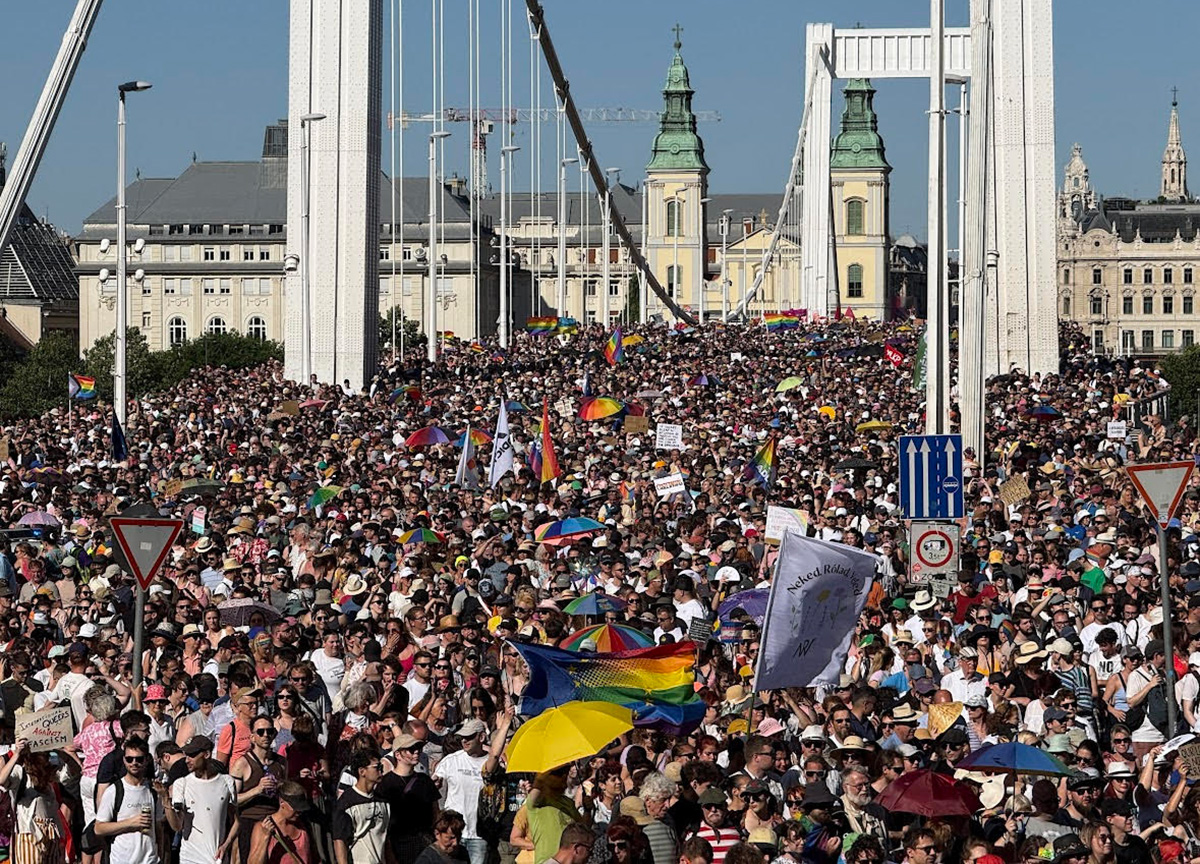
More than 100,000 people on Saturday defied the Hungarian government’s ban on public LGBTQ events and participated in the 30th annual Budapest Pride parade.
The New York Times published a picture that shows throngs of people marching on Budapest’s Erzsébet Bridge over the Danube River. Openly gay MEP Krzysztof Śmiszek, who was previously Poland’s deputy justice minister, is among the dozens of European lawmakers who participated in the march that began at Budapest City Hall.
The New York Times reported Hungarian police officers stood along the march, but they did not try to stop it. Śmiszek described the march to the Washington Blade as “beautiful and huge.”
“[It was] very peaceful and political,” he said.
Prime Minister Viktor Orbán and his Fidesz-KDNP coalition government have faced widespread criticism over its anti-LGBTQ crackdown.
Hungarian lawmakers in March passed a bill that bans Pride events and allow authorities to use facial recognition technology to identify those who participate in them. MPs in April amended the Hungarian constitution to ban public LGBTQ events.
Budapest Mayor Gergely Karácsony endorsed the march, even though Orbán’s government threatened to arrest him and fine participants.
“Today a country shows that no ruling party can tell it on what topic, for what cause it is allowed to march and why not,” said Budapest Pride President Viktória Radványi on Saturday in a Facebook post. “A country demonstrates that whoever will be in government can count on us: dedicated, persistent citizens intolerant to oppression, who will organize themselves and stand against tyranny with their heads held high.”
More than two dozen activists in D.C. who protested outside the Hungarian Embassy on Friday expressed their support for Budapest Pride.
(Washington Blade video by Michael K. Lavers)
-

 U.S. Supreme Court3 days ago
U.S. Supreme Court3 days agoSupreme Court upholds ACA rule that makes PrEP, other preventative care free
-

 U.S. Supreme Court3 days ago
U.S. Supreme Court3 days agoSupreme Court rules parents must have option to opt children out of LGBTQ-specific lessons
-

 India5 days ago
India5 days agoIndian court rules a transgender woman is a woman
-

 National4 days ago
National4 days agoEvan Wolfson on the 10-year legacy of marriage equality



